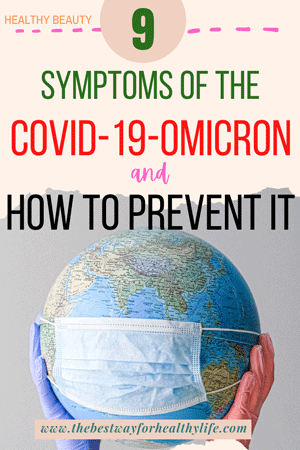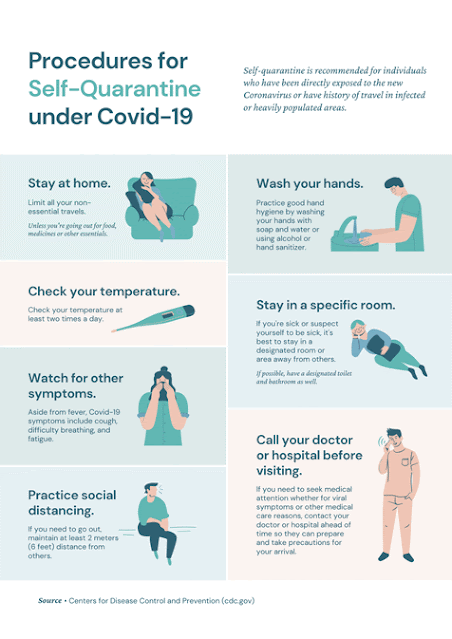9 Symptoms of the COVID-19 Omicron Variant and How to Prevent It
 |
symptoms of covid-19 variant |
9 Symptoms of the COVID-19 Omicron Variant and How to Prevent It
The coronavirus that has been spreading since December 2019, is now known as COVID-19. This COVID-19 is very contagious due to the ability to rapidly spread and mutate, creating new strains with different characteristics in each type. The latest is the Omicron variant, and according to research, this Omicron has a faster transmission compared to other variants. Many countries start to lockdown again in order to stop the spread and transmission of this virus.
The Omicron variant comes after the COVID-19 Delta variant. The Coronavirus with the Omicron variant have been detected for the first time in South Africa, precisely on November 26, 2021. Not long after that, the Omicron began to be found in many places all around the world in just a few weeks.
Based on the results of various reports and studies, there is one thing that is quite reassuring because the symptoms of the coronavirus especially the Omicron variant are not too severe compared to the symptoms caused by other variants of covid-19, the Delta variant. However, the COVID-19 virus with the Omicron variant still needs to be watched out for, especially referring to the fact that the spread and transmission rate of this variant is higher compared to other variants.
Symptoms of Omicron Variant of COVID-19
Based on reports from various studies, it was revealed that the symptoms of the Omicron variant of the coronavirus were not much different from the symptoms caused by COVID-19 in general. Even so, further research on the COVID-19 coronavirus, especially on the Omicron variant, still needs to be done to ascertain the character of the virus.
The following are some of the symptoms of the Omicron variant of COVID-19 that you need to know so that appropriate action and handling can be taken immediately
1. Body feels tired
In the early stages of infection of Coronavirus especially the Omicron variant, one of the things that often happens is the body feels uninspired, achy, always tired or easily tired, lethargic, and feeling weak. But if you experiencing those symptoms, doesn't mean you are 100% getting infected by COVID-19. That is the indication is given by your body that something not right has entered your body. In order to avoid further infection, better you quickly eat more vitamins, rest, and eat well.
2. Have a cold
Colds often occur as a result of a fever. Colds usually do not occur by themselves but this condition will be followed by fever, headache, body aches, muscle aches, and other systemic symptoms. When the body gets a viral attack caused by either the common cold or Covid-19, the body will automatically release inflammatory chemicals and other substances to raise the body temperature, so the virus can be removed immediately by the body's immune system. Due to the increase in body temperature, the body will have fever and colds. And this condition will also make the body's muscles react by generating heat to warm the body temperature.
3. Fever
Fever is an indication of a person who gets infected by Covid-19, where the body temperature is more than 37.7 degrees Celsius. What often happens is that the body temperature rises in the late afternoon, because this is the way the virus produces fever in the human body.
4. Cough
Cough that is a symptom of Covid-19 is a dry cough without phlegm, an itchy throat that occurs continuously. This dry cough usually occurs for at least half a day. This dry type of coughing in the COVID-19 patient is different. The dry cough doesn't happen every now and then, such as the urge to clear your throat or something stuck in your throat. Although people who have a dry cough are not necessarily 100 percent contaminated with Covid-19, this type of cough is more likely to be a sign that the body is infected with the Covid-19 virus than a wet cough that produces phlegm, which is most likely due to an upper respiratory infection.
5. Headache
According to research results, as many as 60% to 75% of patients with confirmed Omicron experience headaches and dizziness. However, headaches and dizziness are not the main symptoms of Covid-19 infection, but these conditions are more of an indication that there is an infection process in the body. Symptoms of a headache or dizziness are inflammatory reaction that occurs when the body fights a virus.
6. Sore throat
According to research, most people who have tested positive with the Omicron variant of Covid-19 are experiencing a sore throat. This sore throat feels different from the usual sore throat. Not like a small tickle in the throat in general but the throat feels sore and dry and causes sharp pain when swallowing. These symptoms are continuously felt and last approximately for three days.
7. Muscle ache
In general, both the common virus and the coronavirus can cause inflammation in muscle tissue. This happens because a viral infection will cause muscle fiber damage. This condition also happened when the Covid-19 virus attacked the body, the virus will trigger an inflammatory response inside the body through inflammatory cytokine and that process causes muscle tissue damage, and in the end, your body will experience muscle pain.
8. Indigestion
Based on various reports and studies, the attack of the COVID-19 virus, especially the omicron variant, not only attacks the upper respiratory tract but is also known to cause indigestion. This happens because the omicron variant also infects the intestinal mucosa so the infection causes inflammation. Indigestion that is usually found is the feeling of nausea, diarrhea, and vomiting.
9. Anosmia and Ageusia
The coronavirus especially the COVID-19 Omicron variant is also known to give you a risk of other typical coronaviruses (COVID-19) symptoms, such as losing the sense of taste or called ageusia and smell or known as anosmia.
Please keep in mind that in some certain cases, the Omicron variant of COVID-19 can cause more severe symptoms, such as shortness of breath. And also, more severe symptoms of omicron can occur, especially in high-risk groups, such as people who have comorbid diseases, the elderly, and people who have never received the COVID-19 vaccine.
How to Prevent COVID-19 Omicron Variant
According to the WHO, it is very important to take steps to prevent the Coronavirus so that the risk of transmission of the Coronavirus, especially the Omicron variant, can be reduced.
The following are preventive steps that can be taken to avoid infection with the Omicron variant of COVID-19:
1. Implement health protocols
Due to the fact that the Omicron variant is more contagious than the Delta variant, it is important for everybody to always follow health protocols to reduce the risk of contracting Coronavirus infection. The health protocols that can be carried out are diligently washing hands, always wearing masks, always keeping the physical distance, avoiding crowded places, and reducing mobility.
2. Getting the COVID-19 vaccine
Many people are still hesitant to get a COVID-19 vaccine because of the hoaxes news that spread widely and conspiracy theories that related to the performance of this vaccine. However, it should be noted that giving the full dose of the COVID-19 vaccine has been shown to make the symptoms of COVID-19 milder and less severe compared to those who did not get the vaccine. This is an important step as one of the efforts to prevent COVID-19, including the Omicron variant of COVID-19. In fact, several studies have stated that the COVID-19 vaccine can provide protection against various variants of the Coronavirus infection, although with varying effectiveness depending on the type of virus.
In addition to the promotion of full-dose vaccines, the provision of additional vaccines in the form of a COVID-19 booster has also been shown to maximize the protective effect against Coronavirus attacks. However, this additional vaccine is more recommended to be given to high-risk groups, such as the elderly, health workers, people with immunodeficiency, and people with comorbid diseases.
3. Implementing a living healthy lifestyle
Implementing a healthy lifestyle is known to increase the body's immune system. The habit of staying up late which causes the body to lack sleep, smoking habits, rarely exercising, often stress, and the habit of consuming alcoholic beverages in excess, are known to weaken the body's immune system. A weak immune system will make the body more susceptible to various types of diseases, including COVID-19. Therefore, in order to make the body's immune system stay strong, you need to live a healthy lifestyle.
4. Eat nutritious food
Regularly consuming foods rich in vitamins, protein, and minerals can strengthen the body's immune system so that the body is not easily attacked by viruses. It can also reduce the risk of being infected with any type of COVID-19, including Omicron. In addition, regularly consuming nutritious food can also prevent the occurrence of COVID-19 with severe symptoms.
To boost your immune system, you can start to eat nutritious foods, such as fish, eggs, meat, milk, chicken, seeds, nuts, and various types of green vegetables, such as brussel sprout, kale, broccoli, and spinach, and eat fruits that high in antioxidant and vitamin C such as berries, guava, lemon, lime, tomatoes, pear, and oranges.
5. Increase consumption of fruits and vegetables high in antioxidants
Regular consumption of fruits and vegetables is one of the food choices that can strengthen the immune system naturally. This is because fruits and vegetables contain lots of antioxidants, vitamins, and minerals that are very important and needed by the body. Fruits and vegetables that can be consumed to increase immunity are pineapples, banana, papaya, apple, lemon, lime, spinach, broccoli, kale, pumpkin, cucumber, and many more.
 |
| Self Quarantine Covid-19 Guide Lines |
Post a Comment for "9 Symptoms of the COVID-19 Omicron Variant and How to Prevent It"